Ebola crisis: How Nigeria's Dr Adadevoh fought the virus
- Published
Son of Nigeria's hero doctor, who spotted Ebola patient, speaks of pride
As Nigeria heaves a collective sigh of relief after being declared free of Ebola, one woman is being widely praised for helping to ensure a more devastating outbreak was avoided.
Dr Stella Ameyo Adadevoh raised a red flag when attending to a Liberian patient at the First Consultant Hospital in Nigeria's main city, Lagos, in July.
Patrick Sawyer had just flown into the country, already sick - he should never have been allowed on the plane.
Nigeria had never had an Ebola case before so it was an impressive piece of diagnostic work.
Whilst caring for Mr Sawyer and protecting the nation from the virus, Dr Adadevoh and her colleagues were themselves at great risk.
"From the day the index patient arrived in Nigeria, my father and I were constantly asking my mother and making sure she was OK. We were aware of what could come," says Bankole Cardoso, Dr Adadevoh's only son.
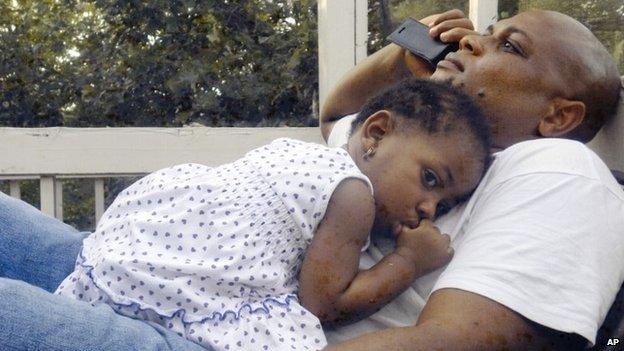
Patrick Sawyer, seen here with his daughter, became the first person to die of Ebola in Nigeria
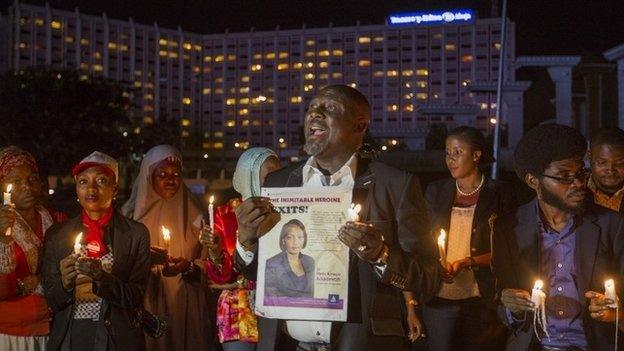
Many Nigerians are mourning the death of the doctor who treated him
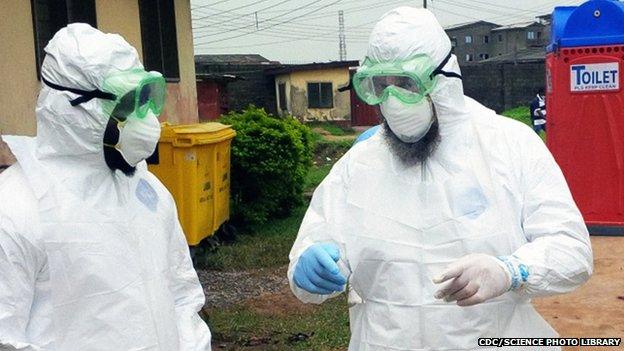
Doctors wear protective equipment outside an Ebola treatment unit in Nigeria
"She was fine all along and then suddenly it became apparent. We were seeing little signs and so of course there was panic and confusion," says the 26-year-old.
These were the early days of the Ebola outbreak and Nigeria was not ready. Dr Adadevoh had already gone to inspect Lagos's rudimentary Ebola treatment centre, and had described it as "uninhabitable", Mr Cardoso says.
'Kidnapping charge'
"So, when she had to go in she was, of course, very worried," recalls Mr Cardoso who followed behind the ambulance in his car.
Dr Adadevoh had earlier already won a different battle - to isolate Mr Sawyer. He had not taken kindly to being told he could not leave.
"Immediately, he was very aggressive. He was more intent on leaving the hospital than anything else," says Dr Benjamin Ohiaeri, the director of First Consultant Hospital.

Ebola virus disease (EVD)
How Ebola survivors’ blood is saving lives
Symptoms include high fever, bleeding and central nervous system damage
Spread by body fluids, such as blood and saliva
Fatality rate can reach 90% - but current outbreak has mortality rate of about 70%
Incubation period is two to 21 days
There is no proven vaccine or cure
Supportive care such as rehydrating patients who have diarrhoea and vomiting can help recovery
Fruit bats, a delicacy for some West Africans, are considered to be virus's natural host

"He was screaming. He pulled his intravenous [tubes] and spilled the blood everywhere."
It has been suggested that Mr Sawyer, who had already lost a sister to Ebola, was not interested in medical assistance as he had set his mind on visiting one of Nigeria's popular Pentecostal churches in search of a cure from one of the so-called miracle pastors.
During those early days caring for Mr Sawyer whilst awaiting the result of the blood test, Dr Adadevo came under intense pressure to let him leave - a move that could have had catastrophic consequences.
"The Liberian ambassador started calling Dr Adadevo, putting pressure on her and the institution. He felt we were kidnapping the gentleman and said it was a denial of his fundamental rights and we could face further actions," says Dr Ohiaeri, adding that the hospital trusted Dr Adadevo's judgment.
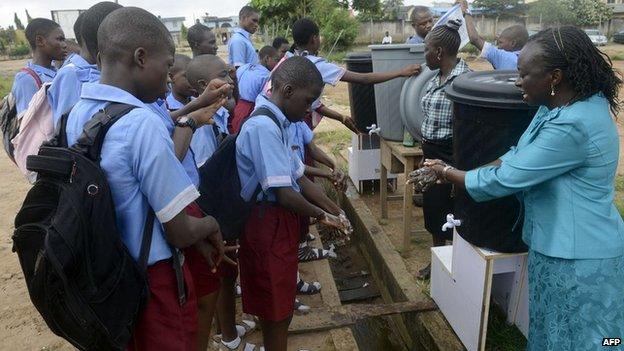
Health workers stress the importance of basic hygiene to prevent the virus from spreading
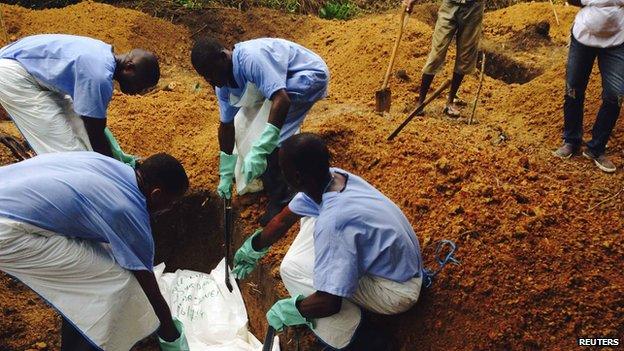
Strict precautions must be observed when burying those who have died of Ebola
"The only way we could be sure and live up to our responsibility to our people, the state and nation - this is all about patriotism at the end of the day - was to keep him here."
Mr Sawyer died in the hospital from Ebola. Dr Adadevoh and eleven of her colleagues caught the virus.
The country's response was being ramped up, though, and a far better treatment facility was opened in Lagos much to the relief of Mr Cardoso for whom the next few days were a rollercoaster.
'Crushing time'
"On the first day I was able to come close and at least stand by the window and have a conversation with her, the second day the same thing," he said.
"I took her things to make her comfortable - towels and slippers and then suddenly the next day I couldn't even go near the window," he added, pointing out that health officials imposed stricter rules on isolating Ebola patients.
"As every day went on she was there - it appeared she may pull through and on my birthday on a Sunday it was the most optimistic day."
"Then on the Monday we went in and the whole story had changed - they called us into a room and just explained that this is exactly what is going to happen and it's not even a matter of days anymore. It might be hours. That was of course the most crushing time of my life," says Mr Cardoso.
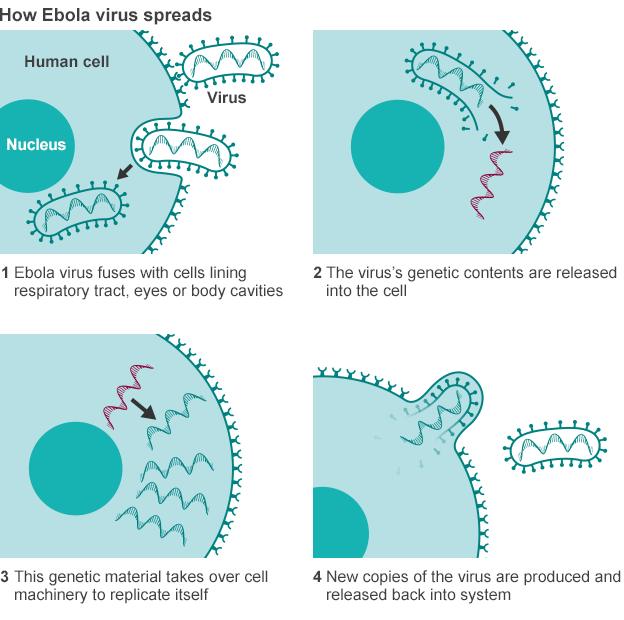
"We lost some of our best staff. Dr Adadevoh had been working with us for 21 years and was perhaps one of the most brilliant physicians. I worked with her. I know that she was sheer genius," says Dr Ohiaeri.
In the Nigerian media, Dr Adadevoh was praised as a heroine but her grieving son, at that time, found it hard to read the articles which he has now proudly collated in a folder.
"I'd had such a big loss [that] I was trying to close myself off from everything. So it was hard for me and then with time it became more and more apparent exactly what she had done," Mr Cardoso says.
"By identifying the index patient it really helped Nigeria to prepare and get ready to trace everybody and I think that's the difference between us and our West African neighbours - Guinea, Liberia and Sierra Leone," he adds.
Mr Cardoso says the outpouring of praise for his mother fills him with immense pride and has softened the blow.
"I wonder how one individual has so much connection with so many people. So, it's like we shared her with everybody which is special."
But Dr Adadevoh's only child knows his country may not be out of the woods despite being declared Ebola-free.
"People were very paranoid and in the last few weeks it has calmed down. I just hope with this news they don't let their guard down," he says.